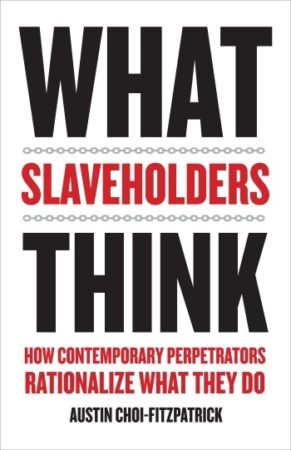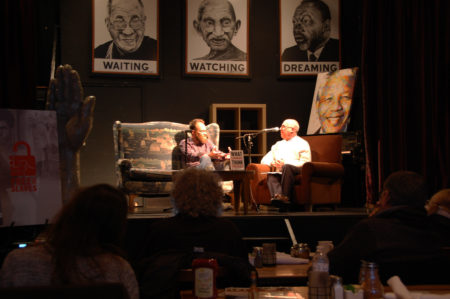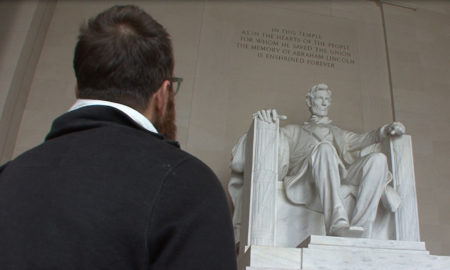Austin Choi-Fitzpatrick asks big questions. Who are we? What do we want to make of life? Who counts as human? And in the historical reckoning of slavery—how do we want to be judged?
In his staunch support of Free the Slaves, Choi-Fitzpatrick thinks deeply about that. “We need to widen our lens,” he says. Slavery is a critical contemporary issue affecting tens of millions of people worldwide. It’s also the product of a particular society and set of circumstances.
Choi-Fitzpatrick has dedicated his career as a scholar and educator to unpacking the issues of slavery, to looking at the “big warp and woof of history.” His fierce curiosity demands answers, and gives him an unusual perspective.
A New View of Slavery
Why does this happen over and over?
Choi-Fitzpatrick was struck 20 years ago by the enormity of modern slavery and a strong urge to do something about it. He has committed his time and resources to FTS, donating book royalties to support our critical community-based work. At the University of San Diego’s Joan B. Kroc School of Peace Studies, Choi-Fitzpatrick focuses on culture, politics and social change, especially the manifold, radical ways society must address its core evils. He dedicates himself to this cause for two reasons: immediate needs on the ground, and the totality of the slavery relationship between people within a community.
“We need to better understand the lives of both perpetrators and survivors,” Choi-Fitzpatrick says. “What whole communities look like.”
The more he thought about enslaved individuals, the more he thought about the people on the other side: the enslavers. His recent book, What Slaveholders Think: How Contemporary Perpetrators Rationalize What They Do, tackles slavery in a bold new way.
Choi-Fitzpatrick spent months in India interviewing hundreds of slaveholders, victims, villagers, and local activists about slavery and emancipation. What Slaveholders Think tells original stories from perpetrators’ perspectives, neither justifying nor excusing their crimes. His audacious assessment brings fresh scrutiny to bear on an ancient, intractable issue.
“Emancipation looks complicated,” he says. “It looks possible, but it’s complicated. How we get there relies on us having a fuller picture of all the actors involved.” He hopes a new view of slavery will give us better tools for understanding how we can help communities come out of slavery together.

Perpetrators Speak
Who are the bad guys?
Slaveholders are not merely villains, so their stories can be hard to tell. An impoverished grain farmer told Choi-Fitzpatrick he could only make his harvest by using bonded labor. Funded by a small loan from an international development agency, he and his family live on the knife-edge of economic ruin.
“It’s a horrible situation for everybody involved,” Choi-Fitzpatrick says. “These are complicated lives lived by complicated people, who do things for complicated reasons.” Perpetrators play an important role in this story.
Anti-slavery efforts, rightly, first treat victims. But they may also characterize slaveholders one-dimensionally, as criminals alone. Fighting slavery means taking its full measure, not one-half of it.
Answers Demand Action
If this is the nature of the problem, what’s the nature of the solution?
Complicated problems require sophisticated solutions: community-wide efforts that truly address poverty, inequality, vulnerability, ignorance, and human rights violations.
Choi-Fitzpatrick supports FTS because that is exactly the fieldwork we do. “I give to Free the Slaves because it addresses the problem as it actually is. People want to know, is there an answer for this? It’s nice to be able to say that there is.”

Book launch benefit for Free the Slaves
Join Us to Finish the Fight
What’s necessary to close the deal on freedom?
Icons of abolition were pioneers of emancipation legislatively, legally, and politically. Now we are tasked to fight slavery not just superficially, clinically, but fundamentally. To Choi-Fitzpatrick, that means major cultural, social, and economic investments that render slavery illegal, unthinkable, untenable, and impossible.
“Laws are the first step,” Choi-Fitzpatrick says. “But action that actually reduces inequality and poverty—that’s what’s going to end slavery for good.” He wants to be on the winning side of history, to be part of a movement that actually did something.

“People should join us. If you want to be part of history, of hundreds of years of a story that has the ability to write its own conclusion, now…I’d be part of that.”
Slavery ensnares both victims and perpetrators. FTS works on the ground to free entire communities. Choi-Fitzpatrick supports our crucial work. Will you? Your donation spreads freedom worldwide.
Free the Slaves needs your help.
Learn more. Take Action. Donate Today.
We Don’t Free Slaves, You Do!




